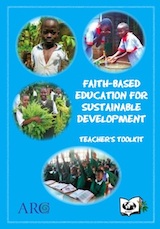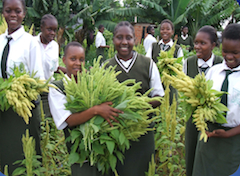|
|
|
|
 |
|
ESD teachers' toolkit
ARC and our African partners have created a fabulous teacher's toolkit that integrates faith values about caring for creation with teaching on the environment in primary schools.
The "Faith-based Education for Sustainable Development Toolkit" has a wordy title, and it's taken a long time, but the inside is inspiring, and beautiful and full of examples that not only teachers in Africa but also several Education Ministers in Sub-Saharan Africa have said will be invaluable in teaching children about why - and how, of course - nature should be protected at every level.
After a meeting and eight-day workshop in Kenya in March 2012 we worked with the Kenya Organization for Environmental Education (KOEE) and faith partners from the Catholic Church of Kenya, the Methodist Church in Kenya, the Presbyterian Church of East Africa, the Anglican church of Kenya and the Supreme Council of Kenyan Muslims (SUPKEM) to create the book.
Why it was needed
The religions play an enormous role in schools worldwide, particularly in Africa where 60-80% of schools are estimated to have been established, run or funded by faith groups.
The United Nations promotes education for sustainable development as a way of guiding and motivating people to work towards sustainable livelihoods, participate in a democratic society and live in a sustainable manner. It includes environmental education and teaching on core values. But in Africa there were few interesting resources for children and primary school teachers.
 |
 |
 |
The Teachers' Toolkit was produced in partnership by ARC and the Kenya Organisation for Environmental Education (KOEE) |
And the key word here is "interesting".
Currently environmental education is taught through individual subjects in Kenyan schools, rather than as a subject in its own right, but nowhere is the faith mandate for taking action to protect the planet emphasised.
And when you look at it, the faith mandate is a strong one.
Teachers' toolkit
The book is for faith primary schools, initially in Kenya but ultimately throughout sub Saharan Africa. The idea is to strengthen the roles that faith schools play in tackling environmental issues while also strengthening the link between faith traditions themselves and school teachings about the environment.
It was released in the summer of 2013 after first being piloted in a number of partner schools in Kenya. Following its launch in Kenya, the plan is that the toolkit can be adapted for use elsewhere in sub-Saharan Africa.
 |
 |
 |
Pupils at Koibei High School proudly showing off their harvest |
Its foreword has been written by the Permanent Secretary of the Ministry of Education, Professor George Godia, who said the Faith-based Education for Sustainable Development Toolkit “could not have come at a better time”, adding: “I salute the Kenya Organization for Environmental Education and the Alliance of Religions and Conservation for this joint and timely initiative.”
Peter Nyagrowa, Secretary General of the Christian Churches’ Education Association, said the faith-based ESD toolkit “carries hope for Africa. This material will go a long way in improving the quality of education as well moulding the moral and spiritual aspects of our school-going youth into responsible and God-fearing citizens”.
What people are saying about the toolkit:
Rev. Fr. Vincent Wambugu, General Secretary of Kenya Conference of Catholic Bishops, said the toolkit is “a great tool to use to use in moulding our youth to become champions of the environment... At the Catholic Church, we are convinced that our children, who are the leaders of tomorrow, need to be adequately equipped to face tomorrow’s challenges. If we want our children to live in a clean, healthy and secure environment, we need to prepare them for the future they will inherit.”
Abdalla M. Kamwana, Programme Manager of the Supreme Council of Kenya Muslims: “It is a comprehensive and broad-based piece of work that will ensure pupils are nurtured with a heart for the environment in their formative years for the benefit of all humanity, both present and future.”
S.B. Varma, National Chairman, Hindu Council Of Kenya: “This publication is an important and integral part of imparting faith-based values that enrich ESD, while providing the motivation for environmental conservation.”
Mounkaila Goumandakoye, Director and Regional Representative, UNEP Regional Office for Africa: "The faith-based approach to Education for Sustainable Development is of critical importance in promoting responsible behaviour to live sustainably for human progress."
Professor Geoffrey Wahungu, Director General of Kenya’s National Environment Management Authority: “The role of faith in shaping our value system cannot be over-emphasised. Entrenchment of religious wisdom into ESD is therefore an innovation that we all ought to be proud of.”
For example...
As well as making environmental education part of a whole school approach, eco-schools develop practical projects aimed at solving real problems.
For example, a school in a water-stressed area may introduce water harvesting to provide more water for cooking, drinking and washing. Other schools might introduce tree planting, as part of a reforestation programme, or create a school garden to grow vegetables to supplement pupils' meals.
At ARC's Nairobi celebration in September 2012, Kenyan teacher Tom Barasa gave a presentation entitled Walking the Eco-School Journey on his experience of developing an eco-school at Goibei High School in Western Kenya, with some excellent tips for 'dos and don'ts'.
How one Kenyan school is tackling water and sanitation issues
ARC's Kirsty Main-Ellen visited Kirukuma Primary School in Kenya in September 2012 to see how pupils and teachers have trying to improve their water and sanitation practices.
Kirukuma Primary School from ARC on Vimeo.
More information
Teachers' Toolkit.
ARC's education and water programme.
The development of the toolkit is part of ARC's work with 27 faith groups in sub-Saharan Africa.
|
 |
|
|
|
|
|
 |
March 6, 2012:
Nairobi ARC workshop on religion and environmental teaching
More than 50 teachers and faith leaders from Christian and Muslim groups in sub-Saharan Africa are meeting in Nairobi, Kenya, in March 2012, to discuss how to integrate religious values into education on sustainable development in faith schools. |
 |
Kenya
Find out more about the work our faith partners are doing in Kenya |
 |
September 18, 2012:
UNEP says working with faiths is "top of our priorities" in Africa
UNEP Regional Representative, Mounkaila Goumandakoye told an ARC gathering of senior African faith leaders that working with religions will go to the top of the UNEP agenda in Africa. |
 |
 |
|
|

